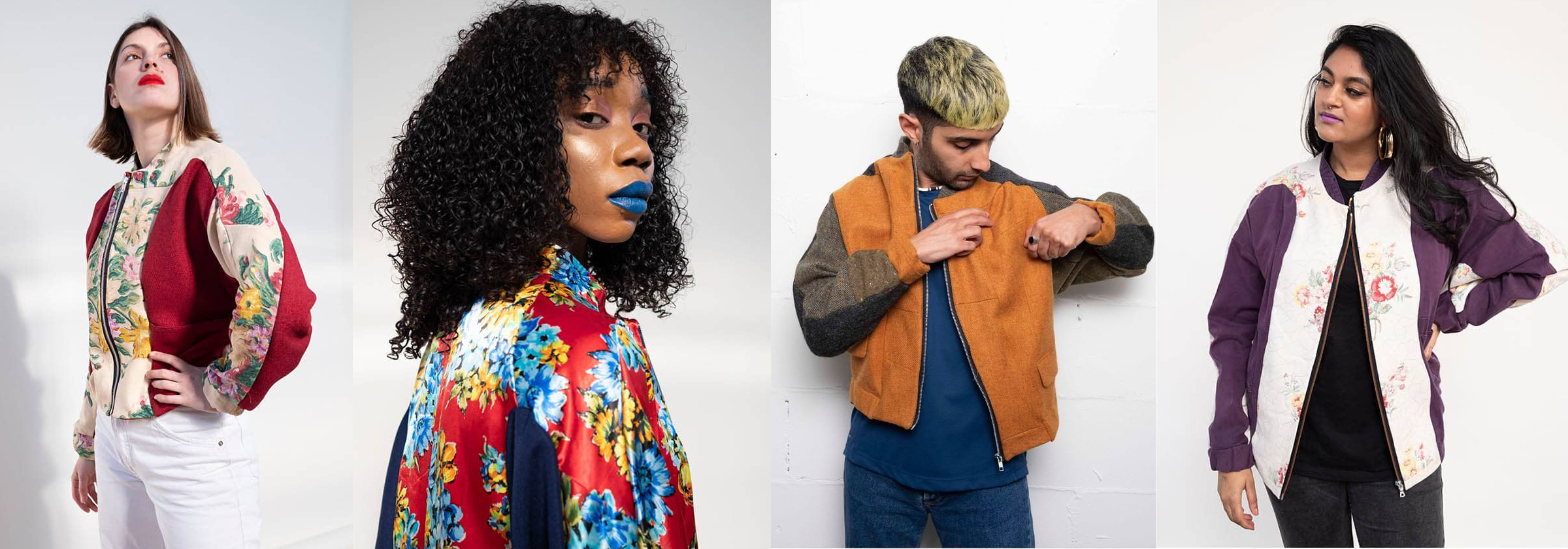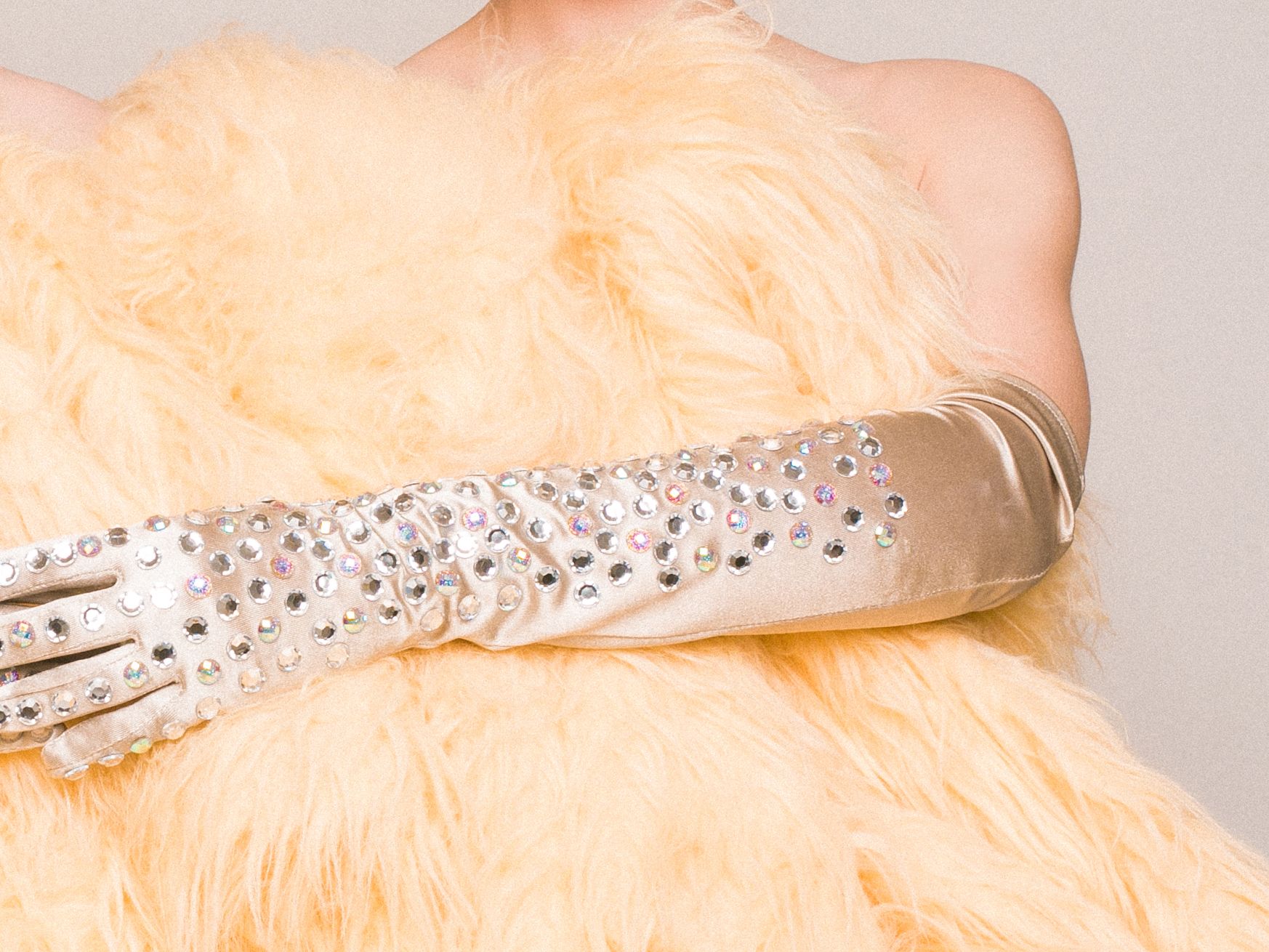JOA was founded by 3 LCF MA Fashion Futures graduates: Olivia Weber, Anna Schuster and Julie Chaussende, who also became winners of the Enterprise Challenge 2019. We caught up with them to hear all about life after the challenge and their advice for those looking to follow in their footsteps.
It’s been a year since you won the Enterprise Challenge. How’s everything going at JOA?
Everything is going well! We had a successful Kickstarter campaign that allowed us to move in a studio space since October. Our next step is to create a volunteering and training program for single mothers of the Borough (Waltham Forest), based around zero waste crafts and rebrand to a Community Interest Company with a different name.

How did winning the Enterprise challenge help you with the process of setting up your own business?
Winning the challenge mainly showed us that, if you persevere, and are resilient, you can achieve a lot. The first time we applied for the SET Challenge, we were not even shortlisted! And the following year, we won the first prize. Since we started, we also progressed so much in terms of branding, and production. The most important thing is to always take a step back and focus on what works.
Being now founders of your own brand, what have been the main challenges you’ve faced during this year?
I think the biggest challenge was the legal side. Founding a company involves so much
paperwork! The second challenge was marketing. At first, it’s all over the place, you want to try everything and then, little by little, you find your flow.
What has kept you motivated during this time? And who have been your biggest supporters during the process?
I think what kept us motivated in moments of doubt was the fact that if we won the SET challenge and had reached our goal during the kickstarter campaign, it meant that the idea had a real potential, and that we had to give it everything we’ve got otherwise we would regret it. Our biggest supporters were Frances Odel and Francesco Mazzarela, our families and friends, but also LCF, who regularly shares our news in their newsletter!
When you pitched the concept of the social enterprise in 2019, it had a really strong focus on sustainability and community empowerment. Has the ethos of the brand remained the same or have you had to re-adapt in any way?
The concept we pitched back then has slightly changed, but is still focused on sustainability and community empowerment. In 2019, we were giving part of our profits to the local charity shop providing us with the clothes for each jacket sold. Now, instead, we focus on trying to create this training and volunteering programme for single local mothers mentioned above. When we moved into our studio, which is in a different area than where we used to be, we realised there was a high demand for that. So in practice, the concept changed, but the idea of empowering the community is stronger than ever.

Why are these 2 concepts (sustainability and community) important for you as fashion designers? Do you believe brands like yours have the power to make a positive impact on the industry?
As fashion designers, we see community as part of sustainability. Indeed, sustainability is not only about being eco, it’s about giving back to the community you are part of (which can be called the social aspect of sustainability). We indeed believe sustainable brands are not sustainable if they don’t make or try to have that kind of impact.
Can you explain what different roles you all play in JOA?
As we all come from slightly different backgrounds and have different skill sets we naturally split into our role. Julie is mainly taking care of our admin and ecommerce and she is keeping us on track when it comes to timing and fulfilling deadlines. Production is mainly Olivia’s duty, as well as graphics, and Anna brings in her eye for fabric combinations. Anna is the PR person, connecting the brand with all kinds of industry players, and arranges all kinds of photoshoots. And together we do business development and all kinds of marketing stuff.
You create unique designs made of discarded fabrics and unsold clothes. What has been the response of the public towards ‘trashionable’ garments like the bomber jackets?
We have so much feedback! Sometimes people can think it’s vintage, because some fabrics we use are so relatable to a specific decade or time, but once they know the story and the craft behind it they are actually impressed and surprised these kinds of methods are doable!
I love the idea of the Sentimental Service. How did you come up with this concept?
My aunt died a few years ago from skin cancer, she was like a second mother to me and losing her was hard. I ended up storing all her clothes at my parents, wearing a few pieces, the ones that fit me, but I just couldn’t let go of all the memory pieces. When we started JOA and really got into the upcycling vibes, I came up with the service, thinking of clothes people have at home that are of sentimental value (like my aunt’s clothes) and how sad it is that they are just unused in a box. Bringing the clothes back to life and more importantly back into your daily life by remaking them into a trashionable bomber jacket seemed like a brilliant idea.”
You’re currently based in the creative fashion hub in Leyton Green. What has it been like for you being part of this business community in East London?
So far, it’s been a great experience. We got to meet so many amazing and inspiring people, and we are working together to make this space known to be an emerging fashion and community hub. We also sometimes organise common pop ups together, and have workshop days.
I think it’s safe to say that in only 1 year JOA has grown immensely. What can we expect from the brand in the next few years?
Our hopes for the following months and years is that we will be able to put our training and volunteering program together, and employ some of the women coming from that program. We hope we will be able to set up a zero waste craft hub that focuses on making trashionable items and upskilling women for a zero waste lifestyle and sustainable fashion industry.
Thinking about your own experience, what’s the best piece of advice you would give to a current student who would like to pursue their ambitions and set up their own brand?
Don’t neglect the administrative side of things. We know when you’re starting, you want to do the fun stuff and you should, but leave yourself some time to take care of these things. Also, get out there, talk to people about your idea, to get as much feedback as possible and adapt your idea. Because trust us, the first idea, is never the one you end up with!
- Keep up to date with the UAL Coronavirus page.
- Follow us on Social Media
- What’s on at LCF: open days and events



